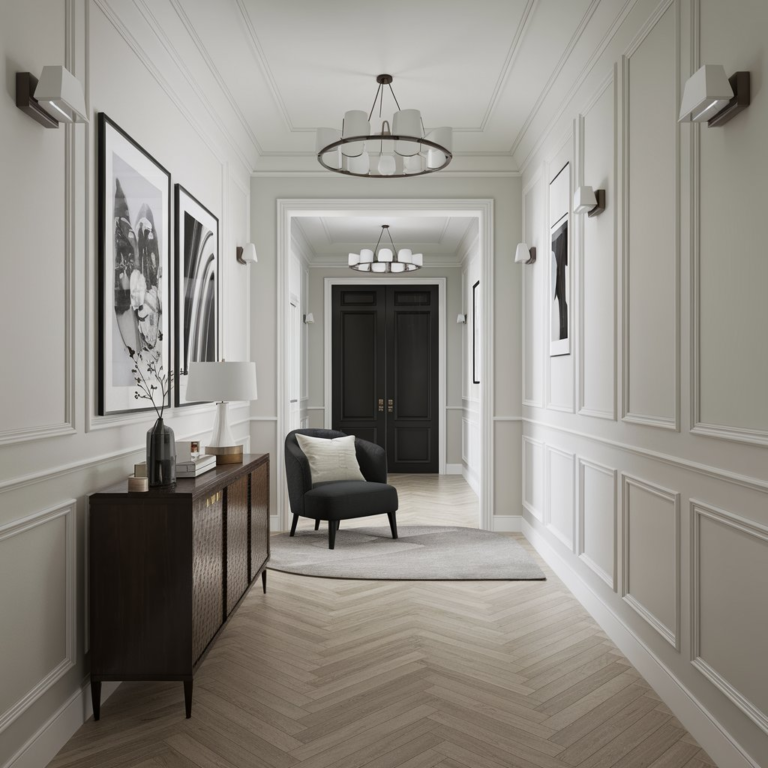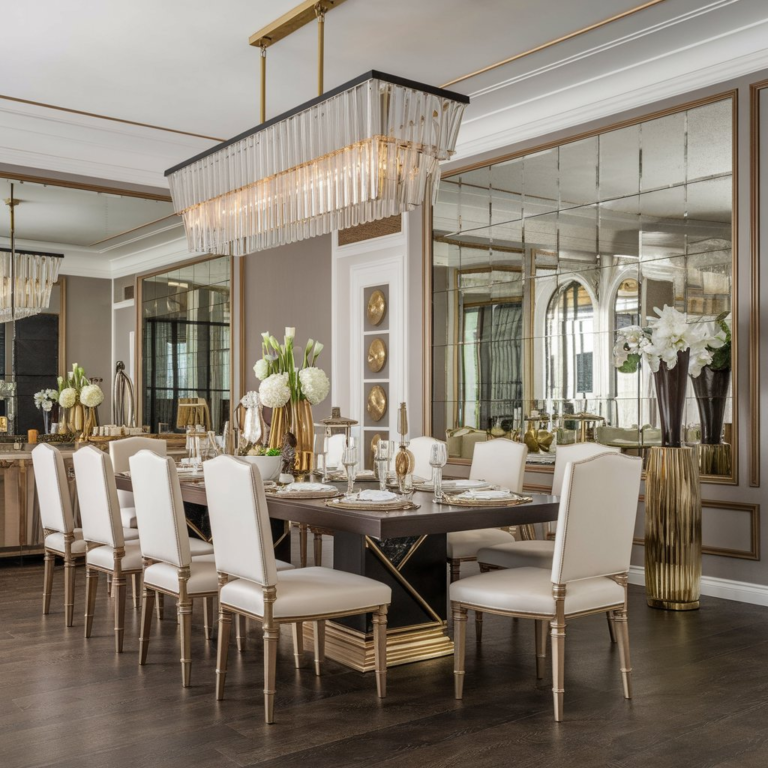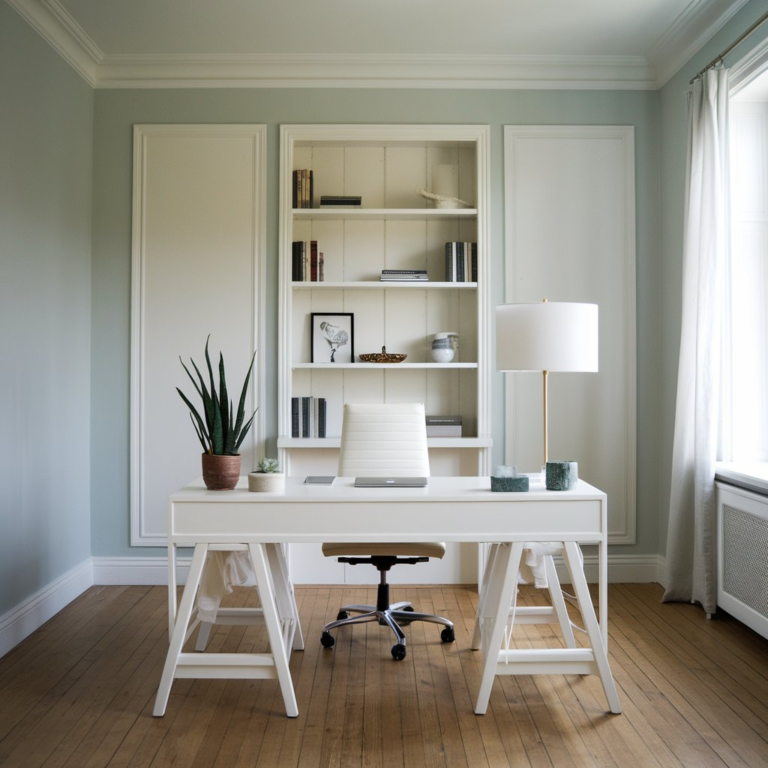28 Feng Shui Bedroom Ideas: Transform Your Space

When it comes to your bedroom, it should be your sanctuary—a place of peace, comfort, and relaxation where you can recharge after a long day.
But if your space feels chaotic or uncomfortable, it might be time to consider the ancient principles of Feng Shui.
Feng Shui is a traditional Chinese practice that aims to create harmony and balance in your environment, aligning the energy flow to promote well-being and prosperity.
1. Choose the Right Bed Placement: Command Position
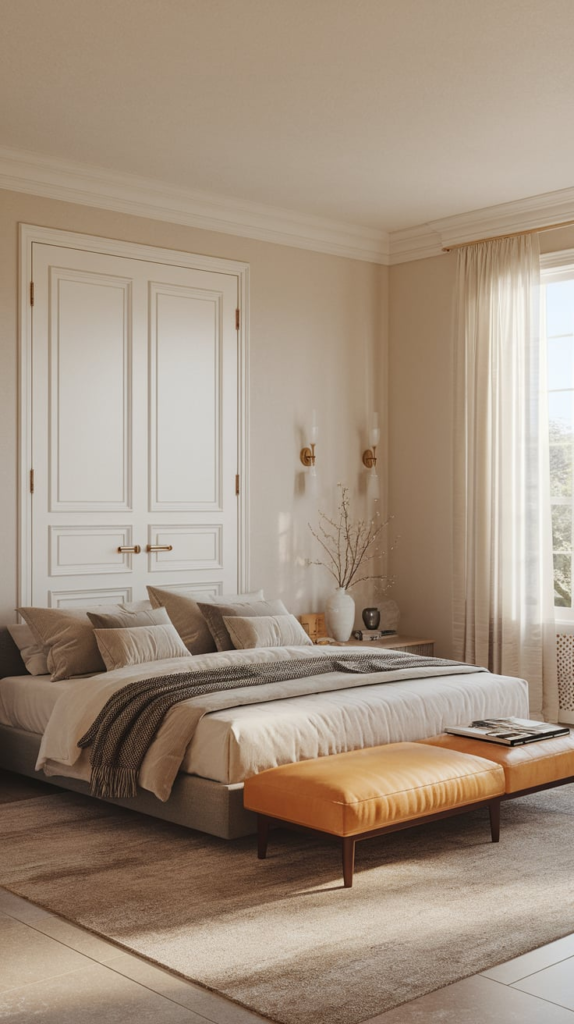
In Feng Shui, the bed is the focal point of your bedroom and plays a pivotal role in creating a harmonious environment. One of the first principles to consider is the command position. Ideally, your bed should be positioned against a solid wall with a clear view of the door, without being directly in line with it. This placement symbolizes control, security, and protection, allowing the flow of positive energy while avoiding any feeling of vulnerability.
Why it works: Being able to see the door while in bed gives a sense of empowerment and security. It’s about being in charge of your own space, as opposed to being blindsided by energy you can’t control.
2. Get a Quality Mattress: Support Your Energy
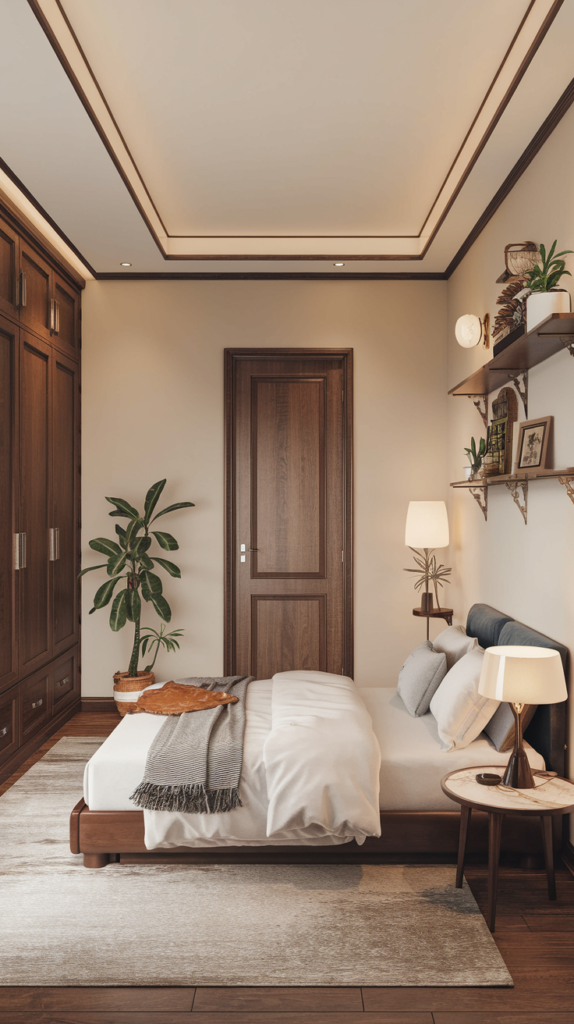
A poor-quality mattress can negatively affect both your physical comfort and your energy levels. In Feng Shui, it’s essential to invest in a mattress that supports both your body and the energy flow in your bedroom. Consider a high-quality mattress with good support, ideally free of any coils or worn-out areas.
Why it works: The right mattress provides physical comfort, which in turn helps you sleep better. A solid night’s sleep is one of the best ways to balance your personal energy and enhance your well-being.
3. Balance the Energy with Symmetry: Equal Sides of the Bed
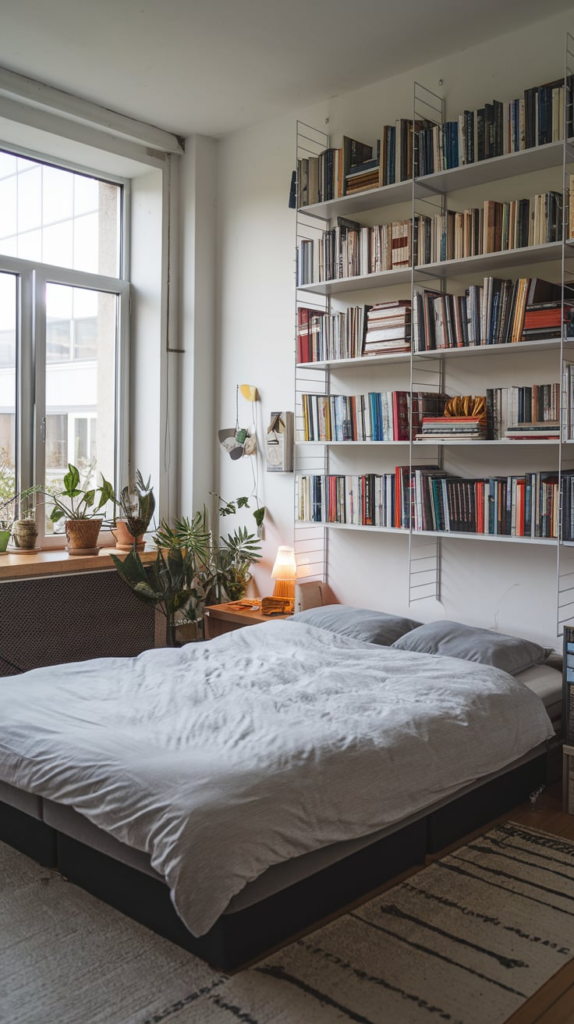
Another key principle in Feng Shui is symmetry. In the bedroom, this often means having equal sides of the bed on either side. This balance is important for creating a sense of harmony, particularly in relationships. Whether it’s two identical nightstands or matching lamps, symmetry signals equality and mutual respect.
Why it works: Symmetry in your bedroom creates balanced energy, which is essential for a peaceful environment and nurturing relationships. This promotes a sense of equality, which is key for maintaining a healthy connection with your partner.
4. Keep the Bedroom Clutter-Free: Declutter for Clarity
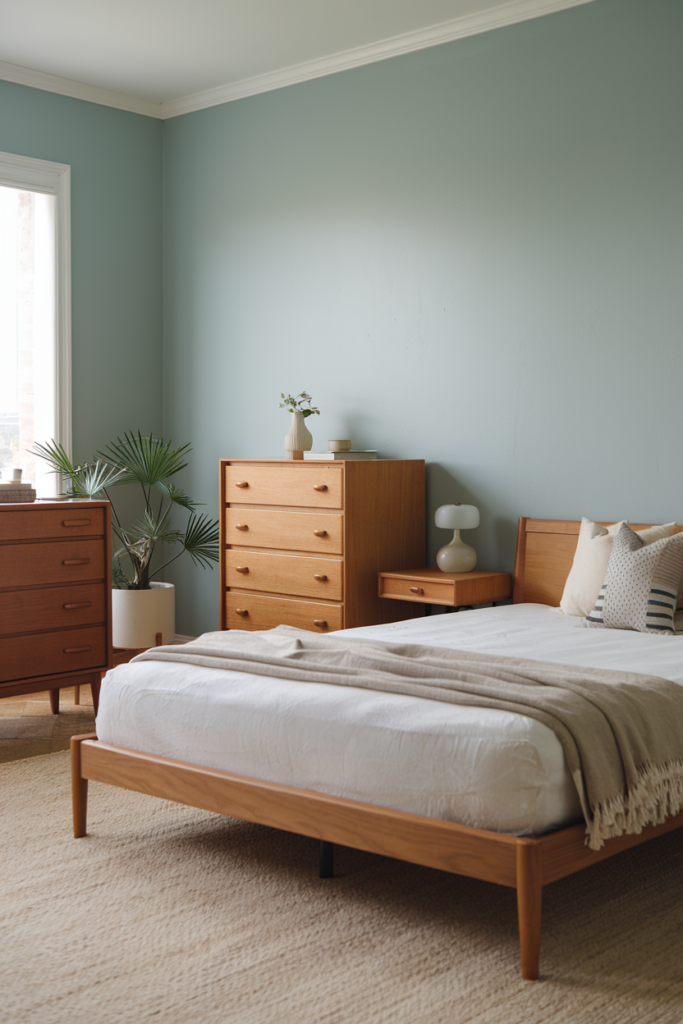
Clutter is one of the fastest ways to disrupt Feng Shui energy. A cluttered bedroom creates stagnant energy that can interfere with your ability to relax, sleep soundly, and find mental clarity. Regularly tidying up and organizing your space helps ensure a smooth flow of positive energy.
Why it works: Clutter blocks energy, leading to mental fog and stress. A clean and organized space allows for the free flow of energy, promoting relaxation and rejuvenation.
5. Opt for Soothing Colors: Soft and Calming Palettes
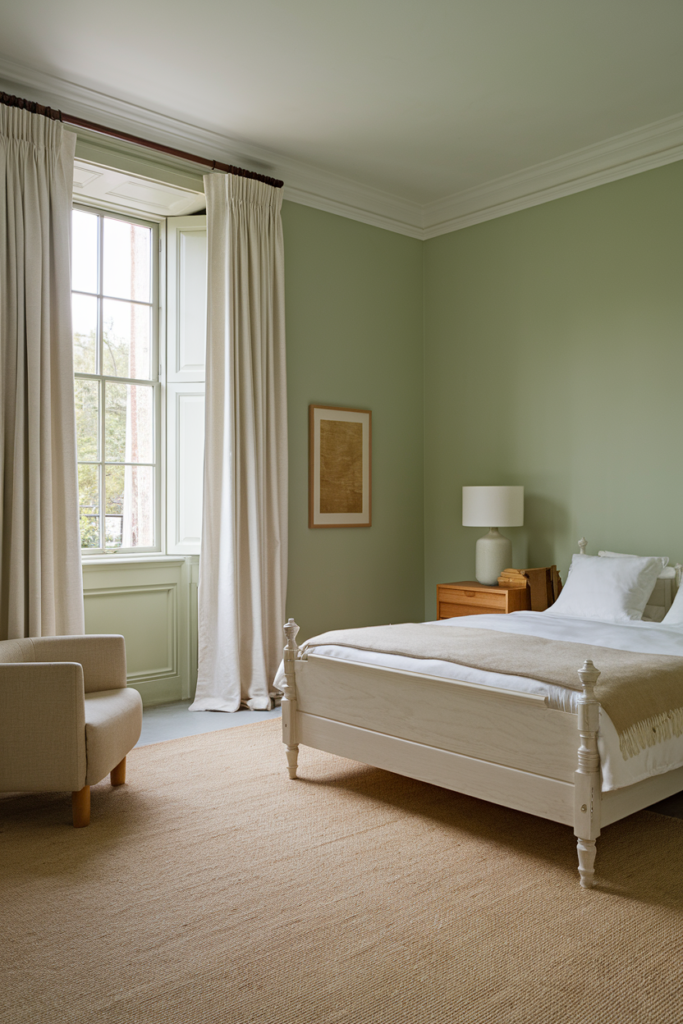
Color plays a huge role in Feng Shui, particularly in the bedroom. To encourage relaxation and restful sleep, opt for soft, muted colors such as pastels, warm neutrals, or earthy tones. Soft blues, gentle greens, light pinks, and warm whites all create a calm, soothing environment conducive to rest.
Why it works: These colors encourage relaxation, peace, and emotional balance. Bright or overly bold colors can be energizing, but in a bedroom, you want to encourage a tranquil atmosphere for deep, restorative sleep.
6. Embrace Soft Lighting: Create a Calming Glow
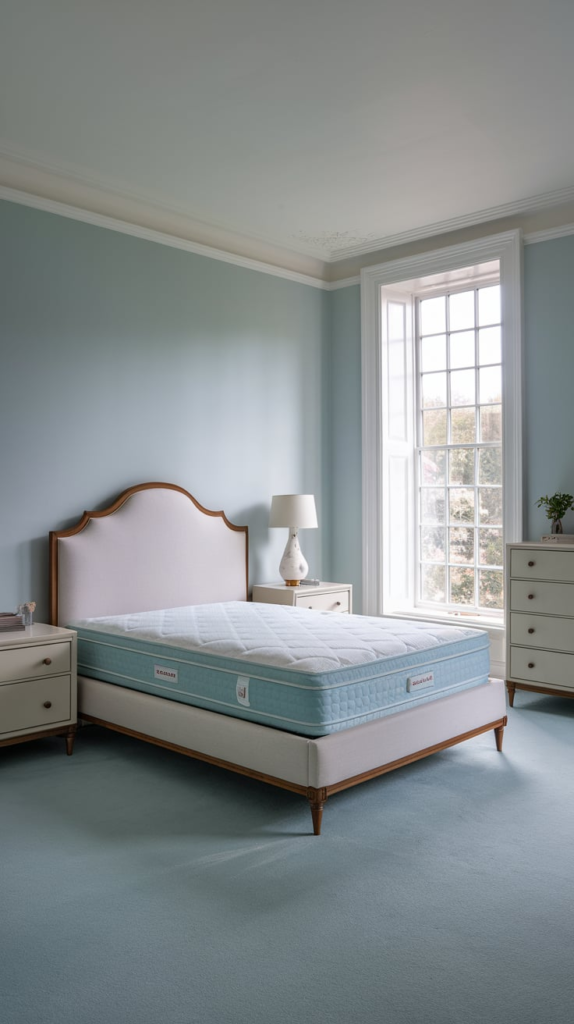
Lighting is another key element in Feng Shui. Too much harsh lighting can disrupt the calming energy in your bedroom, while soft, ambient lighting helps create a peaceful environment. Consider installing dimmer switches, using salt lamps, or incorporating candles (safely, of course) to introduce soft lighting into the space.
Why it works: Soft lighting supports relaxation and helps signal your body that it’s time to wind down. It also minimizes stress and promotes a restful atmosphere that’s ideal for unwinding after a long day.
7. Avoid Electronics Near the Bed: Minimize Disruptions
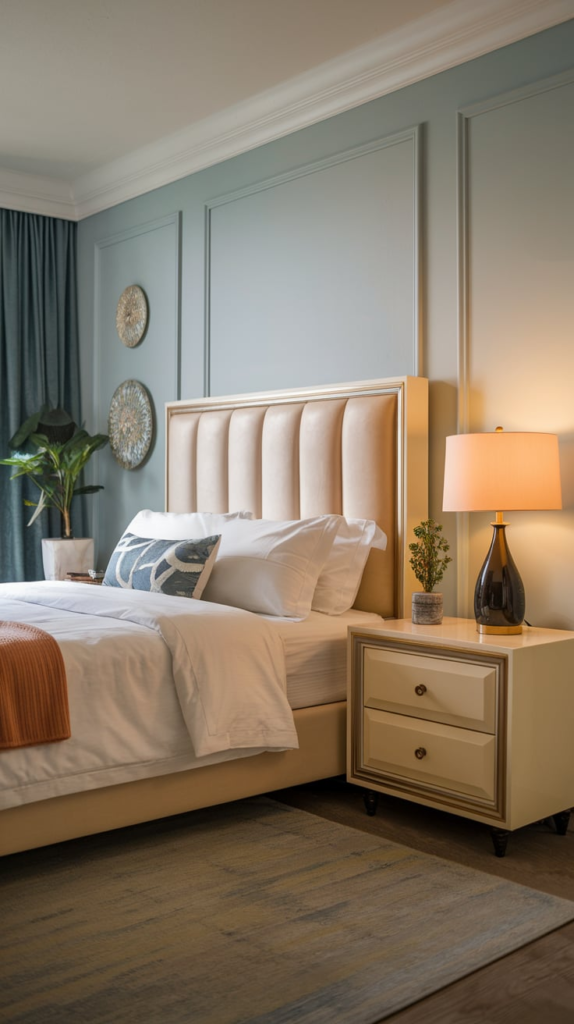
Feng Shui principles advise against placing electronic devices, such as TVs, computers, and even smartphones, near your bed. The energy emitted from electronics can interfere with your natural energy flow, disrupt sleep, and increase stress.
Why it works: Electronics generate electromagnetic fields that can disrupt your energy field, affecting your sleep quality. Keeping them away from the bed helps maintain a peaceful energy balance.
8. Use Natural Materials: Ground Yourself with Nature
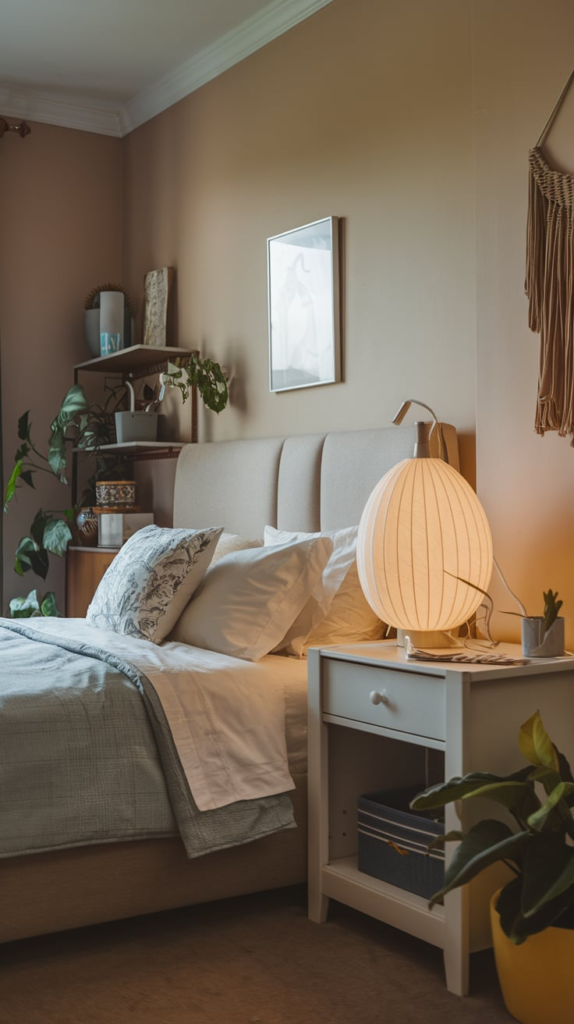
Incorporating natural materials like wood, stone, and cotton into your bedroom design helps foster a sense of grounding and connection to nature. Choose wooden furniture, linen bedding, and stone accents to create a natural, organic atmosphere.
Why it works: Natural materials are calming and help foster a feeling of connection with the earth, promoting grounding energy. This helps you feel more stable, centered, and peaceful.
9. Create a Relaxing Headboard: Support Your Headspace
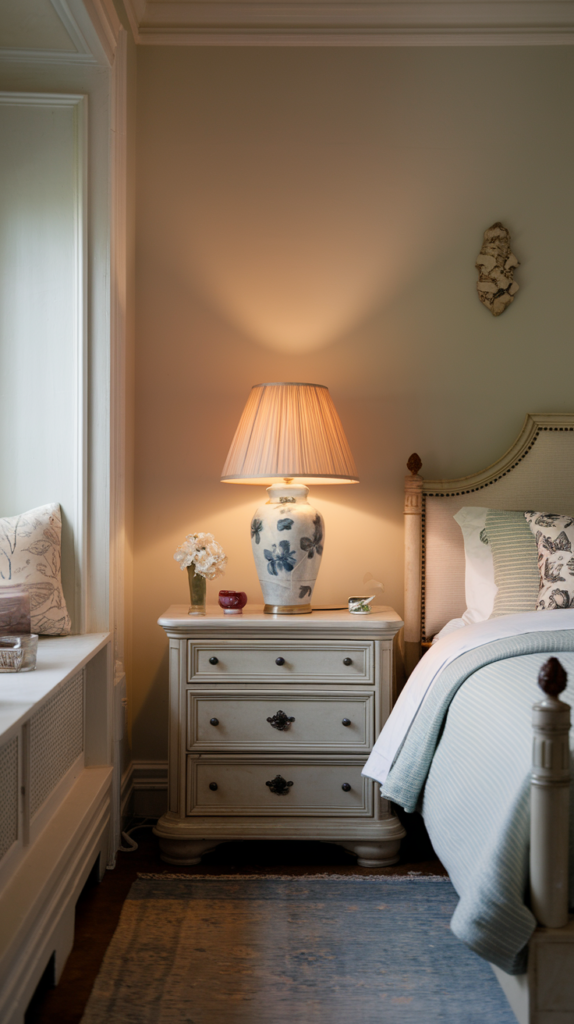
A sturdy headboard is a key element in Feng Shui bedroom design. Not only does it provide physical support while you sleep, but it also symbolizes support for your mental and emotional state. Opt for a solid, supportive headboard (preferably wood or fabric) to create a sense of security.
Why it works: The headboard provides literal and symbolic support, making you feel grounded and secure. A strong, supportive foundation for your head and mind promotes clarity and restful sleep.
10. Add Indoor Plants: Bring Life and Energy
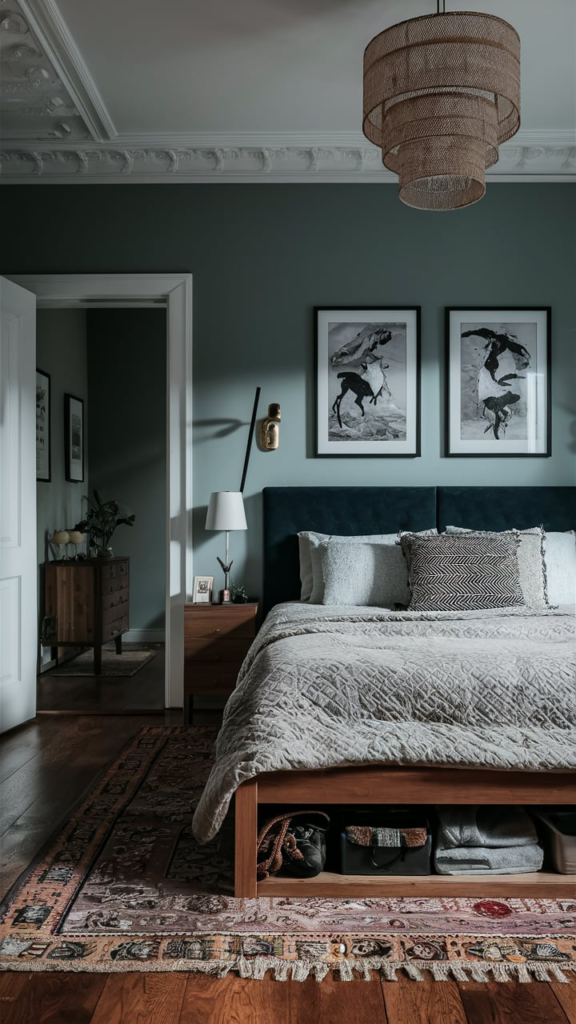
Introducing indoor plants into your bedroom can be a simple yet effective way to enhance the flow of positive energy. Plants such as snake plants, peace lilies, and pothos are not only aesthetically pleasing but also known for their ability to purify the air and add a natural element to your space.
Why it works: Plants are living organisms that contribute to the positive energy in your room. They also help purify the air and create a serene environment, enhancing relaxation and overall well-being.
11. Incorporate Soft Textiles: Enhance Comfort and Softness
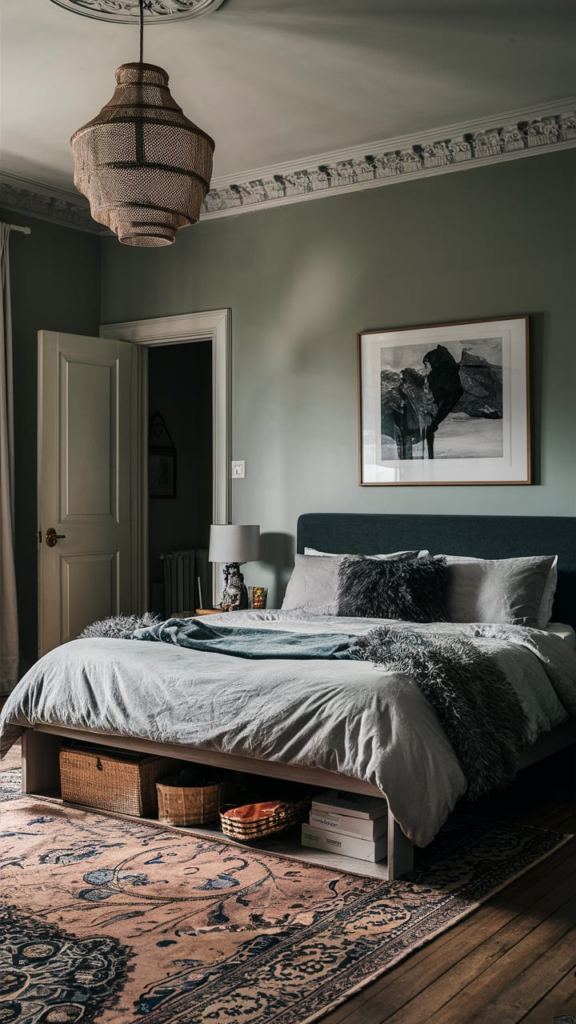
In Feng Shui, soft, comfortable textiles are essential for creating a cozy, restful environment. Invest in high-quality bedding, plush pillows, and soft throws to increase comfort and support restful sleep.
Why it works: Soft textiles create a welcoming atmosphere that encourages relaxation. They also improve the tactile experience of your bedroom, making it a place you’ll want to spend time in.
12. Use Mirrored Décor Cautiously: Reflective Balance
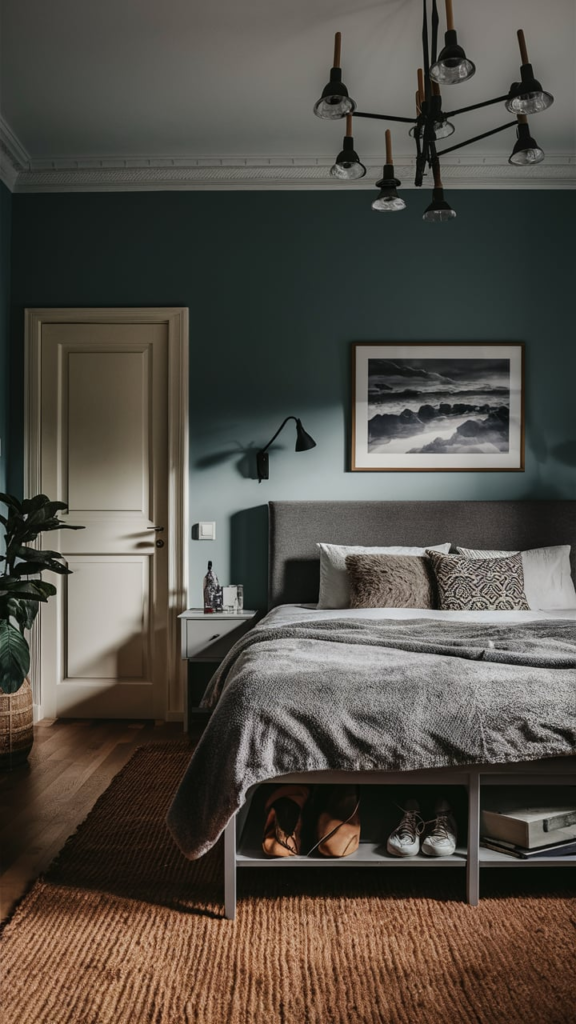
Mirrors are a common element in Feng Shui, but they must be used carefully in the bedroom. Too many mirrors, or mirrors placed in the wrong positions (such as facing the bed), can disrupt the energy flow and cause restlessness. Place mirrors strategically to reflect light and enhance the room’s feel, but avoid positioning them directly across from the bed.
Why it works: Mirrors can amplify energy, so careful placement is important. In the bedroom, you want mirrors to reflect calm, natural light, rather than creating an overwhelming or restive environment.
13. Incorporate Earth Elements: Balance and Stability
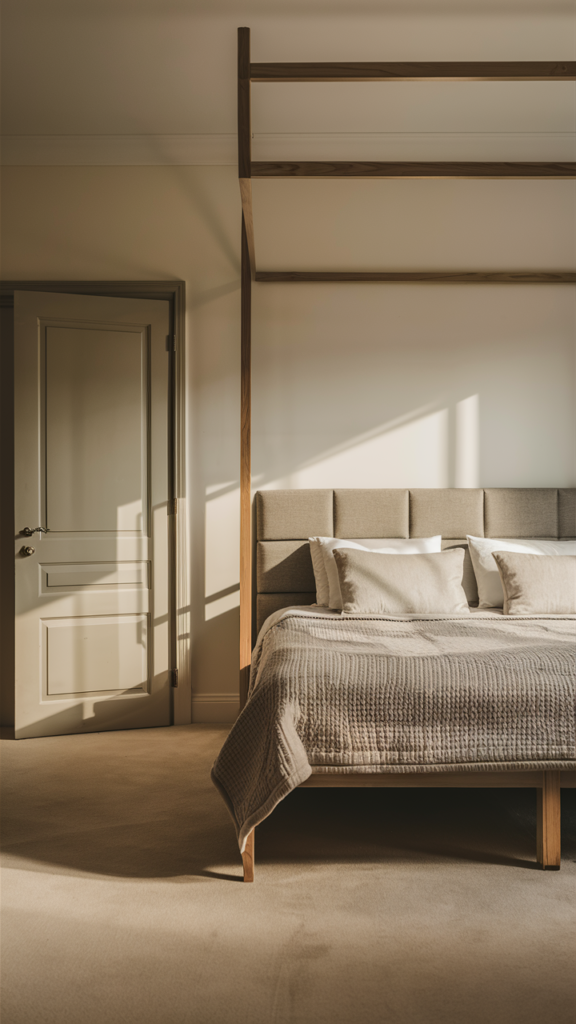
Earthy tones and materials bring balance and stability to your bedroom. Incorporating ceramic, stone, and clay décor, or simply adding earthy colors to your bedding or walls, helps to ground the energy in your space and supports mental clarity.
Why it works: Earth elements provide stability and grounding, which are essential for a calm and balanced bedroom atmosphere. They help soothe the mind and create a secure, peaceful space for relaxation.
14. Avoid Sharp Angles: Embrace Curves and Soft Lines
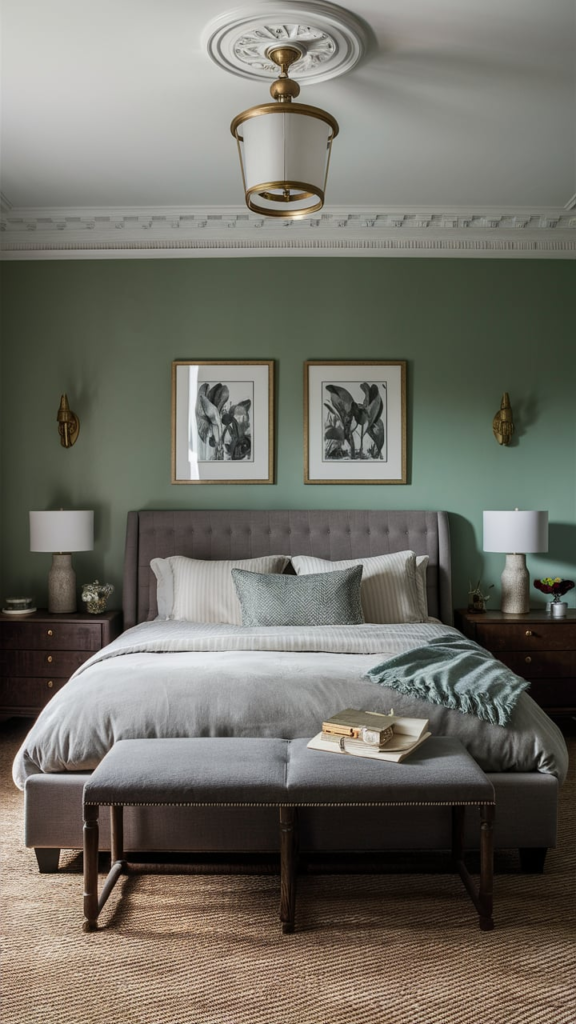
In Feng Shui, sharp angles or pointed furniture edges are considered disruptive to the energy in your bedroom. Try to incorporate furniture with soft, rounded edges or use curved décor to create a smoother flow of energy.
Why it works: Sharp angles can create Sha Chi (negative energy), which can be stressful. Rounded shapes, on the other hand, encourage a harmonious energy flow that fosters calmness and relaxation.
15. Designate a Relaxation Zone: Escape from Stress

Designating a specific area in your bedroom for relaxation—such as a comfy chair or a reading nook—can enhance your ability to unwind. This zone becomes your retreat, a space where you can engage in peaceful activities that help clear your mind, such as meditation or reading.
Why it works: Having a designated space to unwind helps reduce the emotional baggage associated with your bed. It separates relaxation activities from sleep activities, reinforcing the calmness you need to sleep deeply.
16. Use Soft Scents: Aromatherapy for Peace

Scents play a huge role in Feng Shui, especially when it comes to promoting relaxation. Diffusing calming essential oils like lavender, chamomile, or sandalwood can create a peaceful atmosphere conducive to restful sleep.
Why it works: Scents affect our moods and energy levels. Using soothing scents promotes a peaceful, calming environment that invites relaxation and enhances the sleep experience.
17. Choose Calming Artwork: Set the Mood
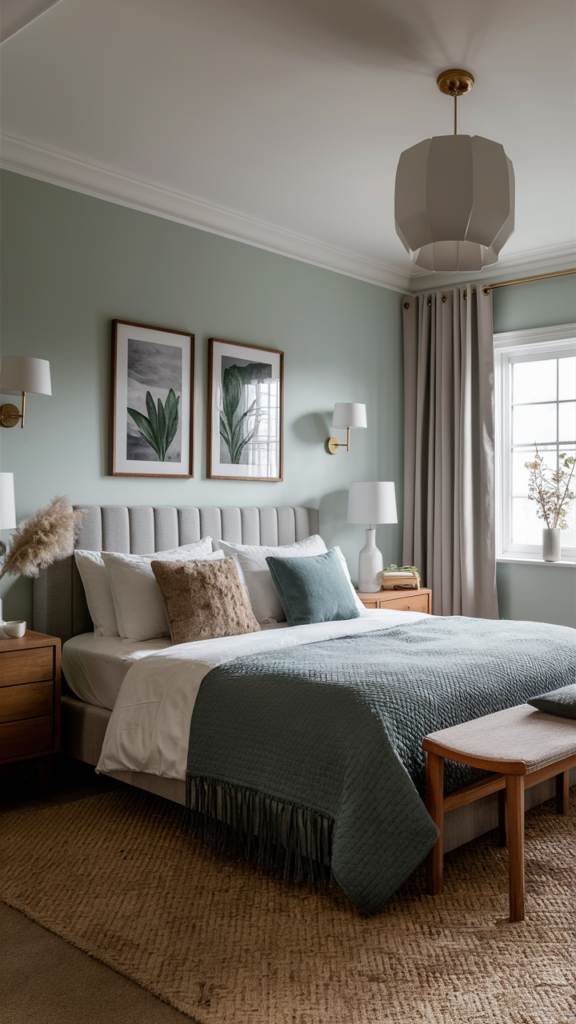
Artwork in your bedroom should inspire peace and serenity. Opt for nature-inspired art, like landscapes, soft florals, or abstract pieces that evoke calm emotions. Avoid any images that may evoke negative feelings or stress.
Why it works: The artwork you choose sets the mood and energy of the room. Soothing, peaceful images help promote relaxation and emotional balance, creating an atmosphere of tranquility.
18. Incorporate the Colors of the Five Elements: Harmony and Balance
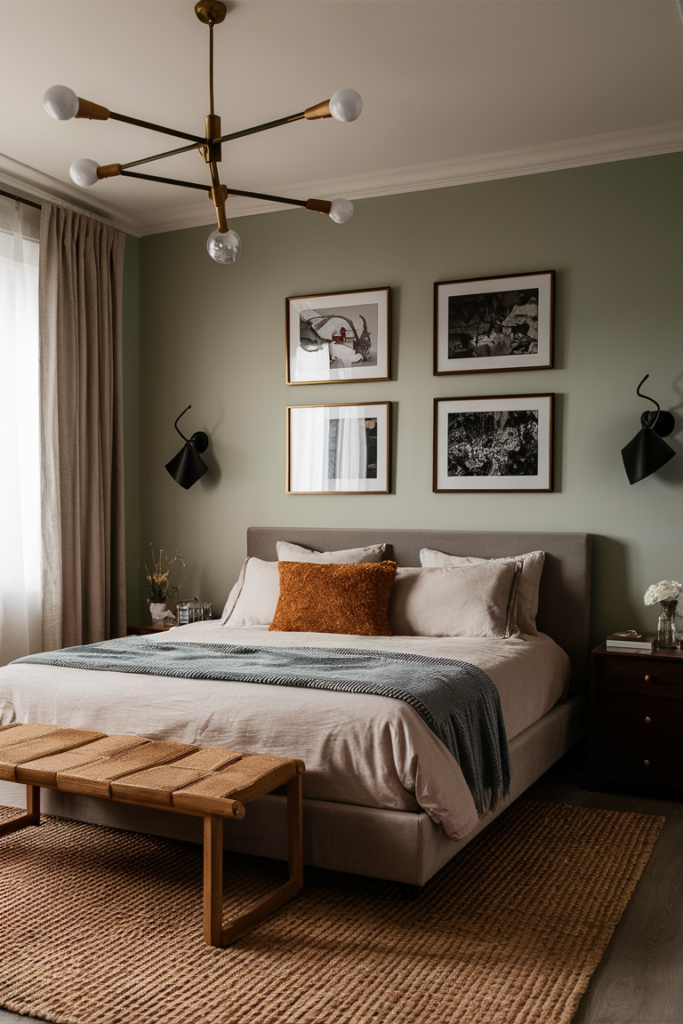
Feng Shui is based on the concept of five elements—wood, fire, earth, metal, and water—and incorporating them into your bedroom design can help balance the room’s energy. Each element has corresponding colors and materials, so you can use them to balance and harmonize your space.
Why it works: By incorporating elements into your bedroom décor, you create a balance of energy that fosters well-being and harmony. Each element brings a unique influence, helping create a fully balanced, harmonious environment.
19. Mind the Ceiling: Create Open Space Above
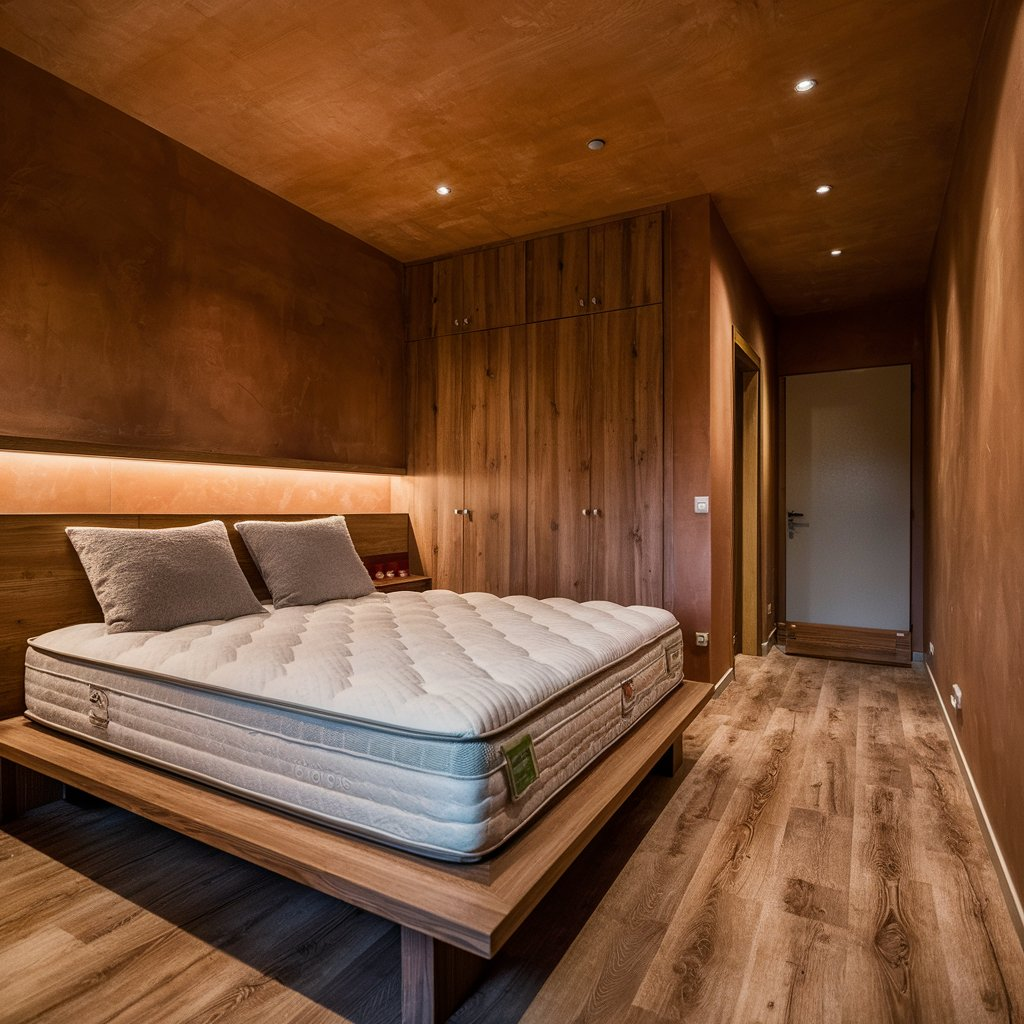
A high ceiling symbolizes freedom, expansion, and growth, while a low ceiling can create a feeling of confinement. Ideally, avoid heavy ceiling beams or low ceilings that can create a sense of pressure. Keep your ceiling light and open to enhance the flow of energy.
Why it works: A clear, open ceiling invites energy to flow freely, creating a more expansive, peaceful environment. Low or obstructed ceilings can block energy and create feelings of heaviness or limitation.
20. Add a Personal Touch: Express Yourself
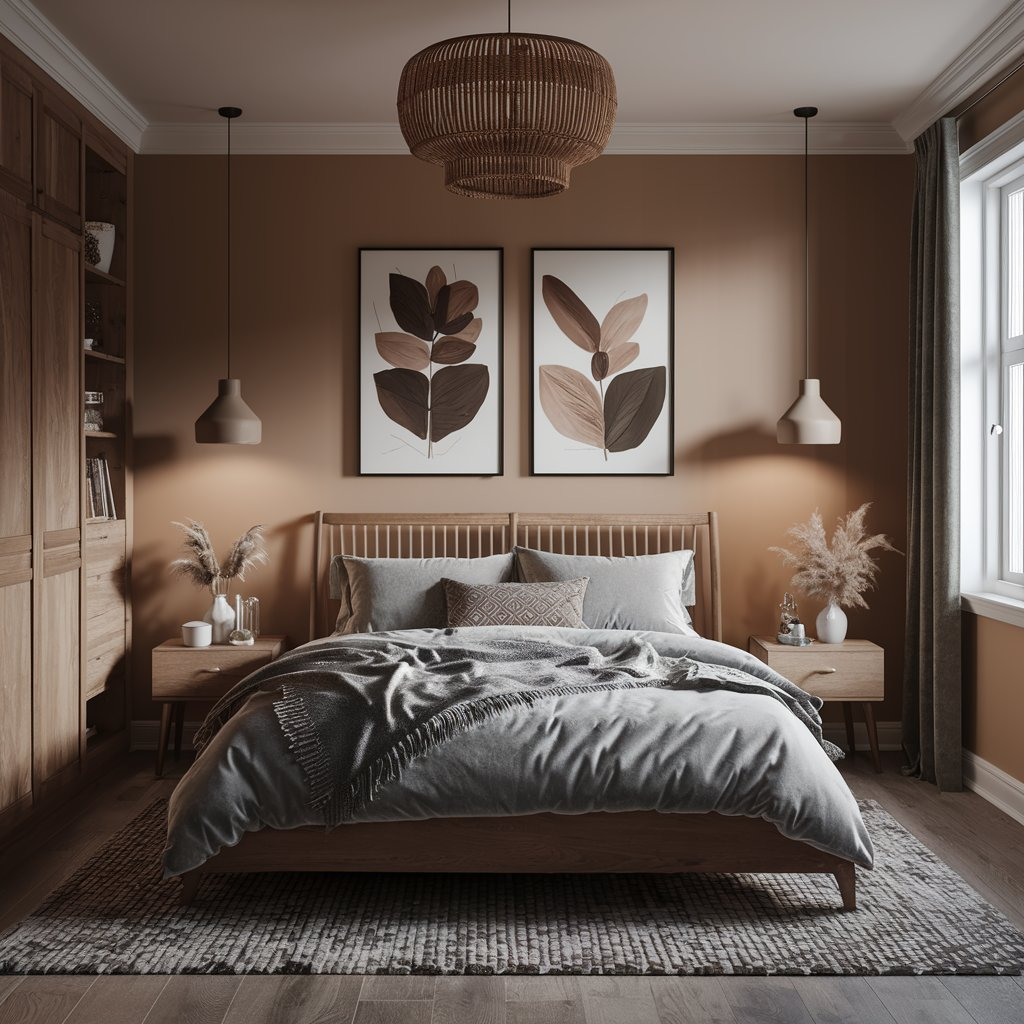
While Feng Shui encourages balance and harmony, it doesn’t mean your bedroom has to be devoid of personality. Add personal touches that inspire joy and positivity, such as family photos or cherished keepsakes. Just be sure not to overcrowd your space with too many personal items.
Why it works: A bedroom should feel personal and nurturing. Adding meaningful touches creates a sense of warmth and emotional connection, enhancing your overall well-being.
21. Maximize Natural Light: Let the Sun In
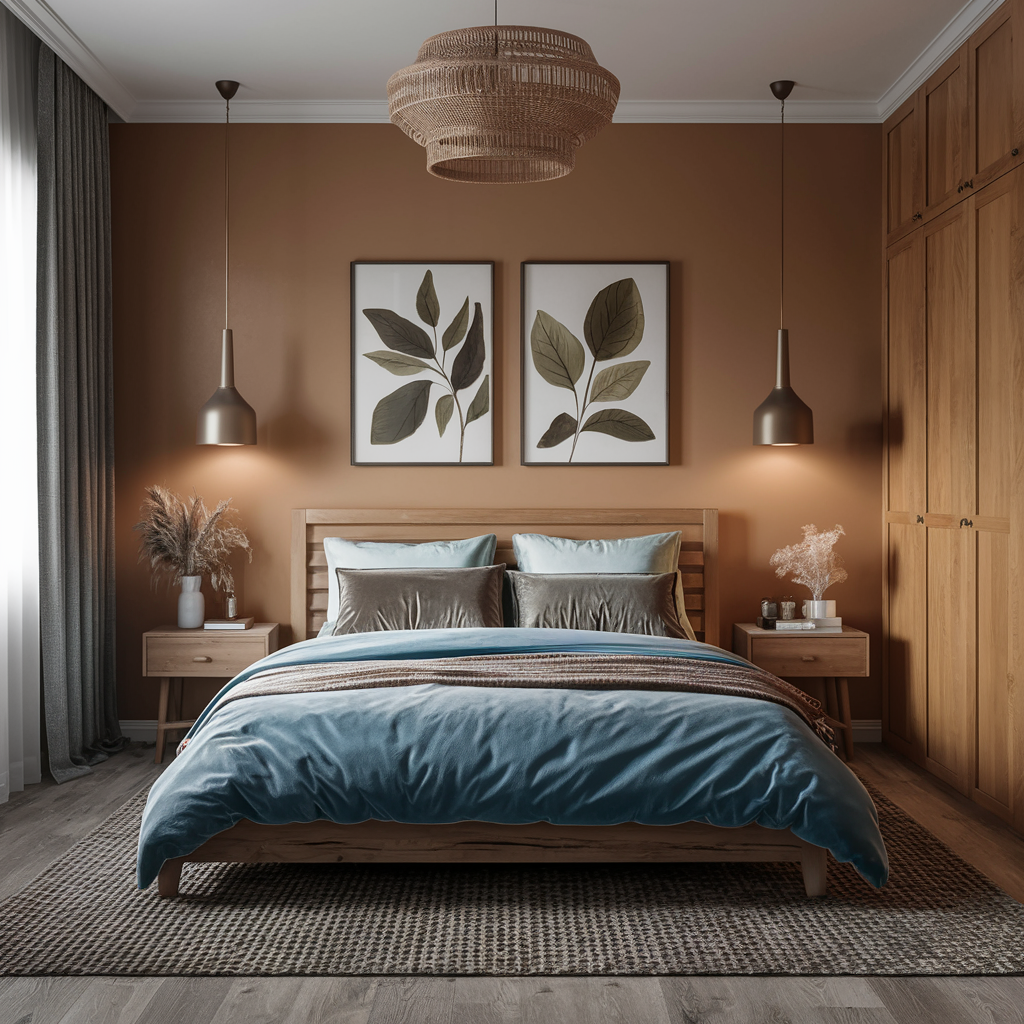
Natural light is a powerful force in Feng Shui, bringing positivity, fresh energy, and vitality into your space. Maximize your bedroom’s exposure to natural light by choosing light curtains or keeping your windows clear of obstructions.
Why it works: Sunlight boosts mood, enhances energy, and supports a healthy circadian rhythm. Exposure to natural light during the day helps regulate your sleep cycle and improves overall well-being.
22. Bring in Water Elements: Flow and Tranquility
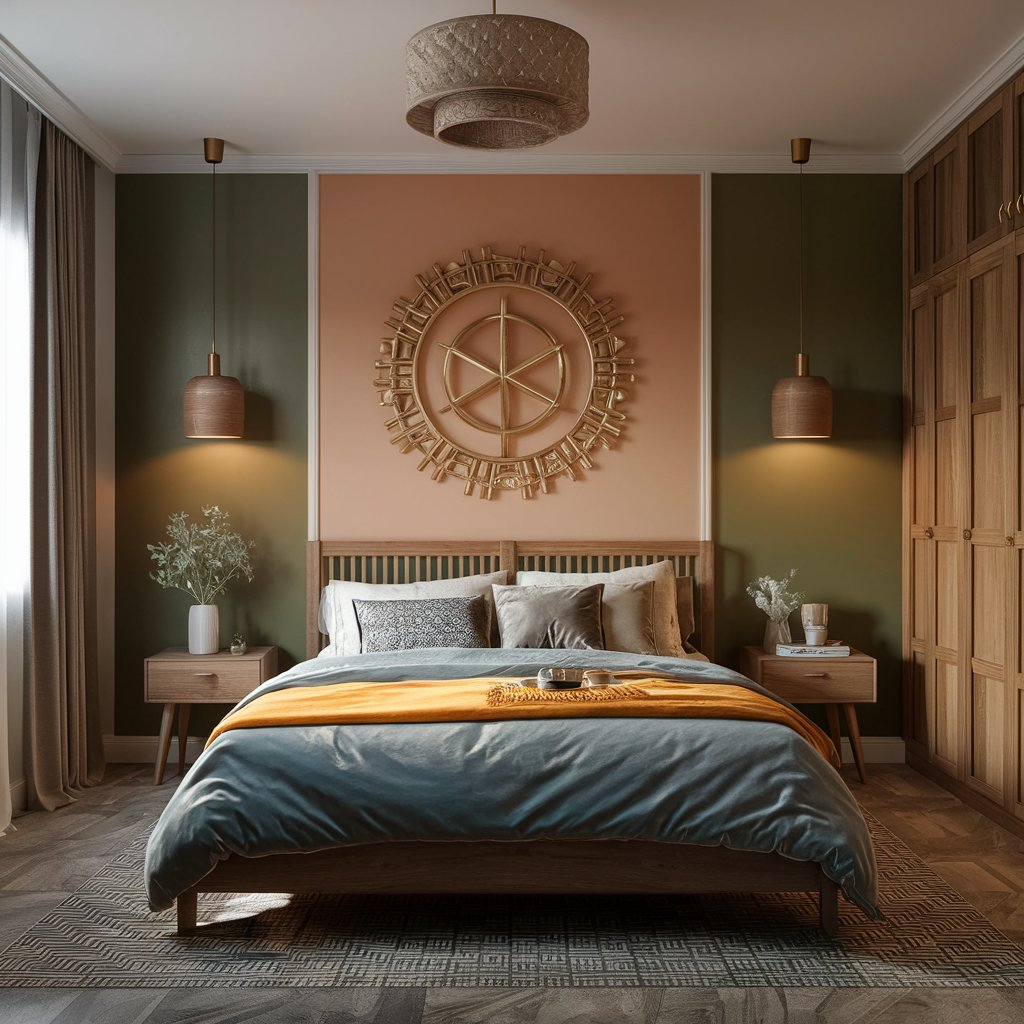
Incorporating water elements, like a small fountain or water features, can enhance the flow of positive energy. Water symbolizes abundance, clarity, and tranquility, and adding it to your bedroom can invite peaceful energy into the space.
Why it works: Water elements bring movement, flow, and a sense of calm. The sound of running water can help create a serene atmosphere, making it easier to relax and sleep.
23. Position Your Furniture Mindfully: Avoid Blocking Pathways

Arrange your bedroom furniture in a way that allows for easy movement and flow. Avoid placing furniture in a way that blocks pathways or restricts movement, as this can obstruct the energy flow and create tension in the space.
Why it works: Allowing for smooth transitions and open space in your room encourages the free flow of energy, which promotes a sense of peace and comfort.
24. Declutter Your Under-Bed Space: Keep It Clear
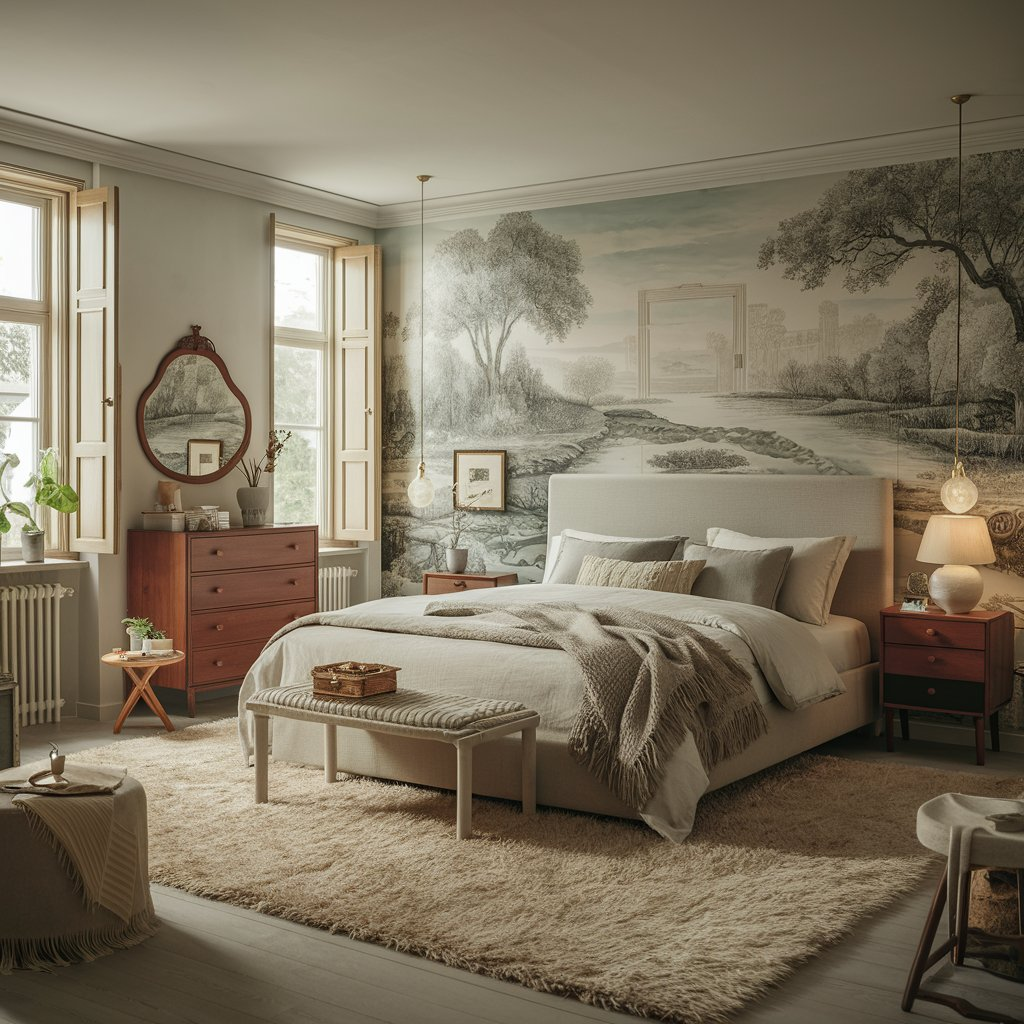
The area under your bed is a powerful energy zone in Feng Shui, and keeping it clear of clutter is essential for maintaining a peaceful environment. Use storage boxes or simply leave the space empty to allow the energy to flow freely.
Why it works: A clutter-free under-bed space encourages balance and positive energy flow, which contributes to a restful and rejuvenating night’s sleep.
25. Select Gentle Patterns: Avoid Overwhelming Designs
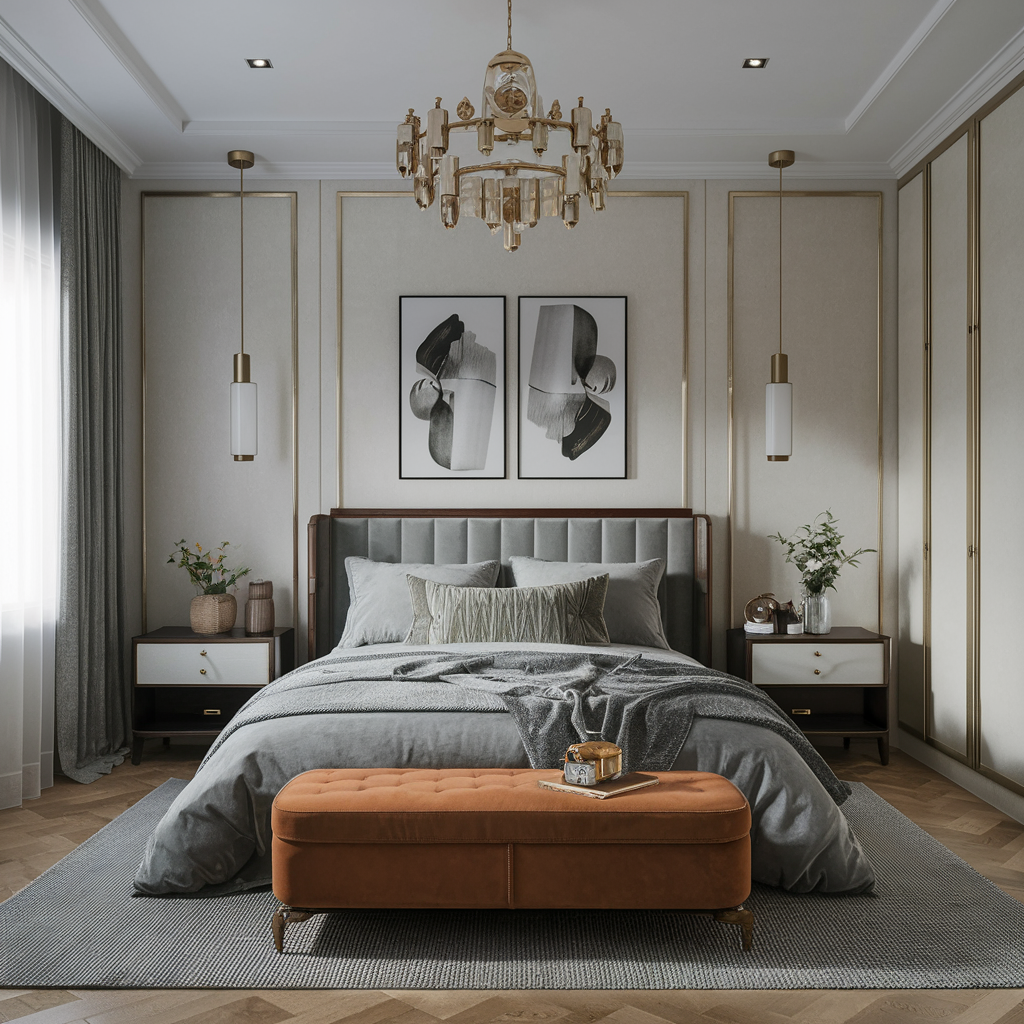
In Feng Shui, patterns should be soft and not overpowering. Bold, sharp patterns can cause visual clutter and disrupt the calming energy of your space. Opt for subtle floral designs, gentle stripes, or minimalistic patterns to create a balanced and peaceful environment.
Why it works: Gentle patterns encourage relaxation without overloading the senses. They enhance the calm, serene vibe in your bedroom, promoting peace and tranquility.
26. Bring in the Yin Energy: Nurture Your Bedroom with Feminine Touches
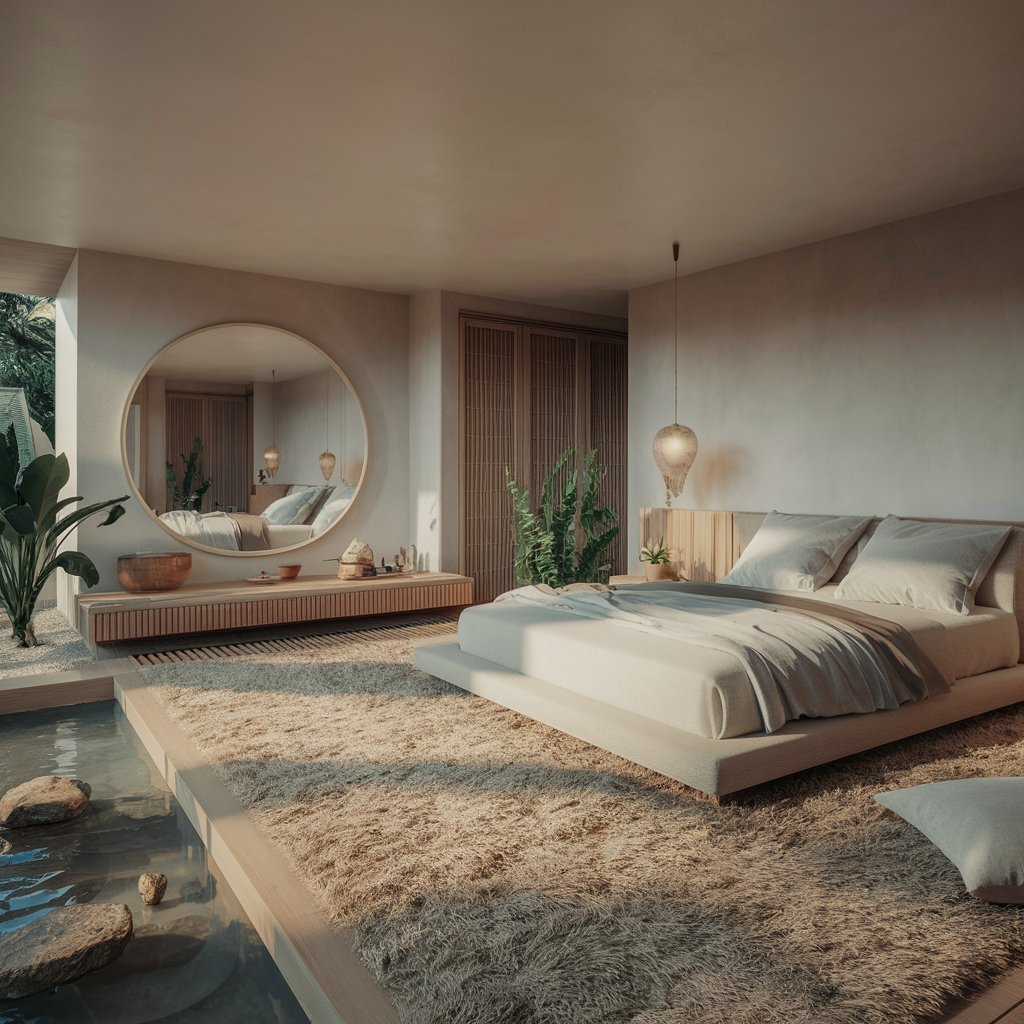
Feng Shui emphasizes the Yin energy in the bedroom, which is the feminine, restful, and nurturing aspect of energy. Soft, flowing fabrics, curved furniture, and delicate décor elements enhance this energy and contribute to a peaceful, restful environment.
Why it works: Yin energy promotes rest, healing, and nurturing. By embracing this energy in your bedroom, you foster a sense of calm and emotional renewal.
27. Avoid Overhead Lights: Soft, Indirect Lighting
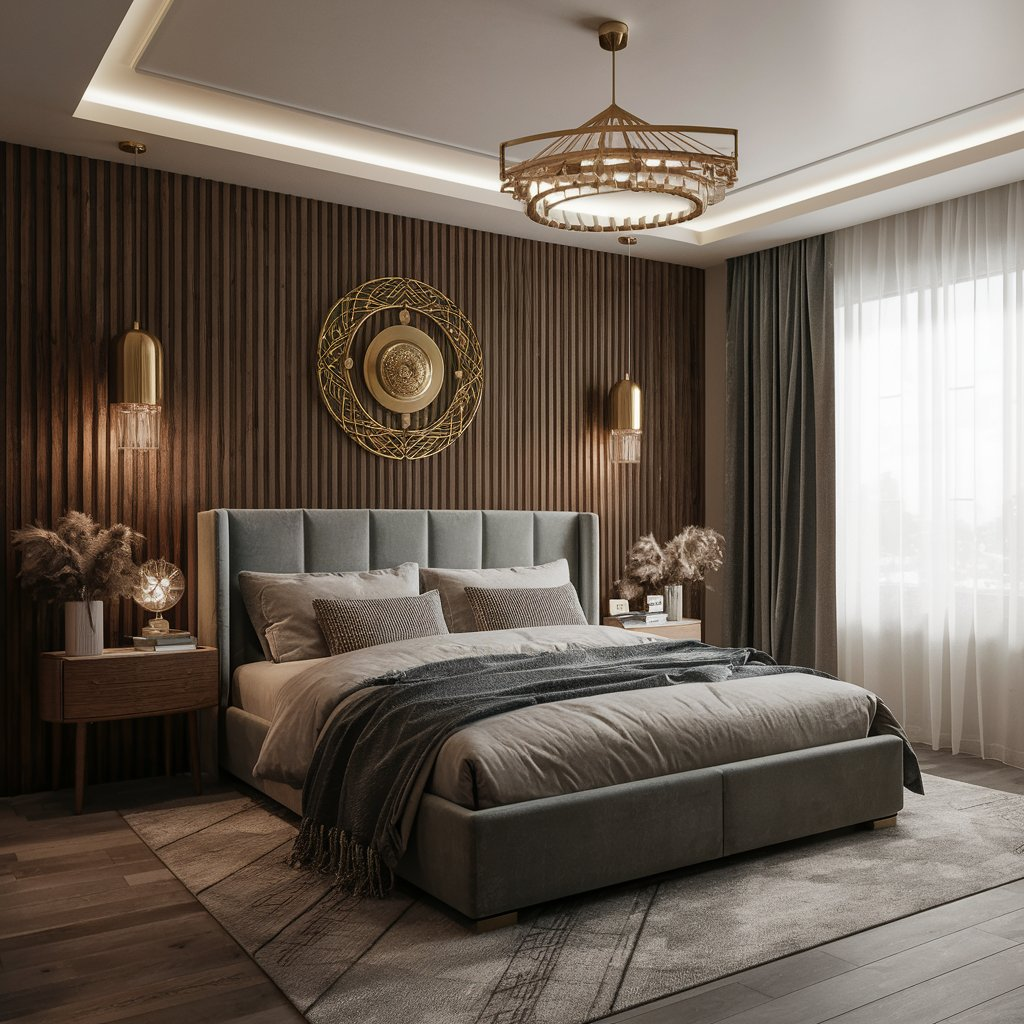
Overhead lighting is often too harsh and can create an uncomfortable atmosphere in the bedroom. Instead, opt for table lamps, wall sconces, or floor lamps with soft lighting to create a more inviting, soothing environment.
Why it works: Indirect lighting softens the atmosphere and helps regulate the room’s energy flow, promoting a relaxing, peaceful ambiance conducive to restful sleep.
28. Use Color Wisely: Intuition and Harmony
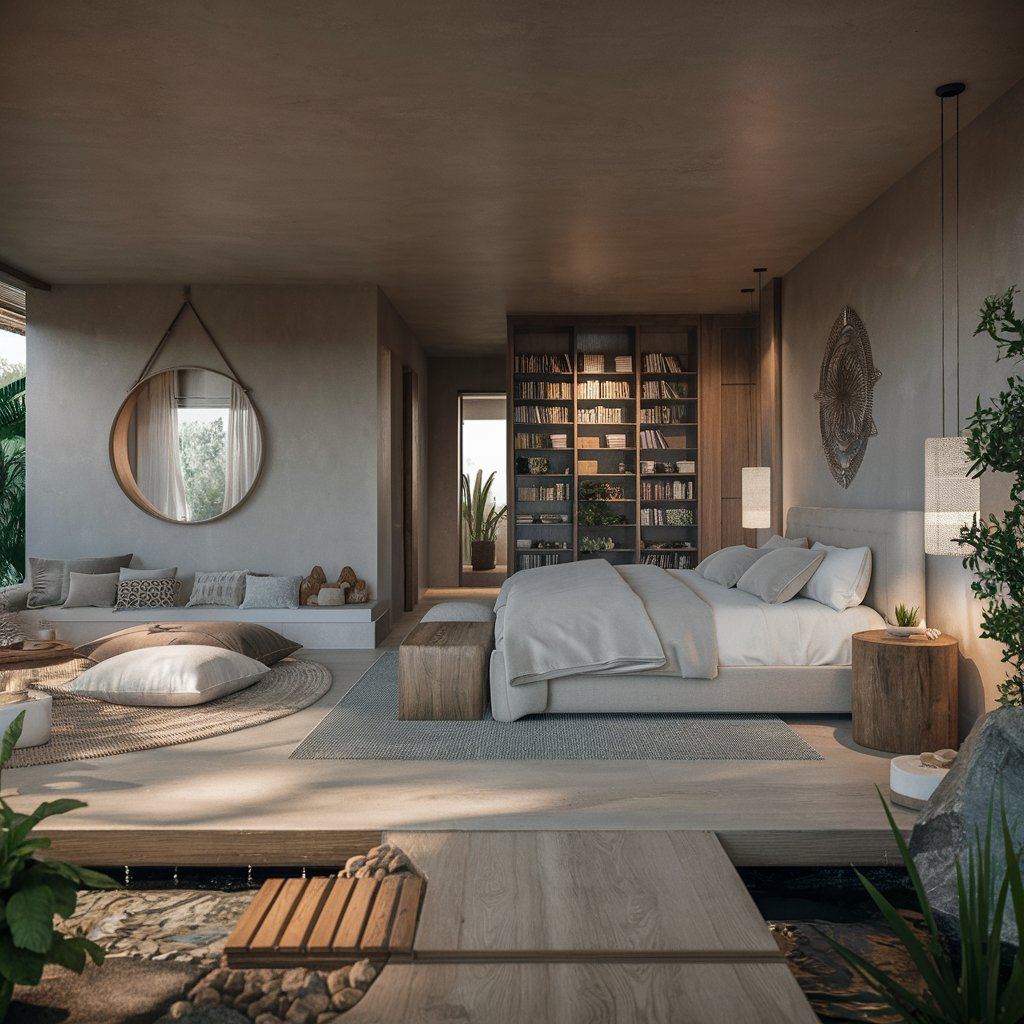
Finally, remember that color is deeply connected to our emotions and energy. Choose colors that resonate with you personally, balancing the five elements and considering how each color makes you feel. Your intuition will guide you in creating a bedroom that feels aligned with your needs.
Why it works: When you choose colors based on how they make you feel, you create an environment that promotes balance, harmony, and tranquility.
Conclusion
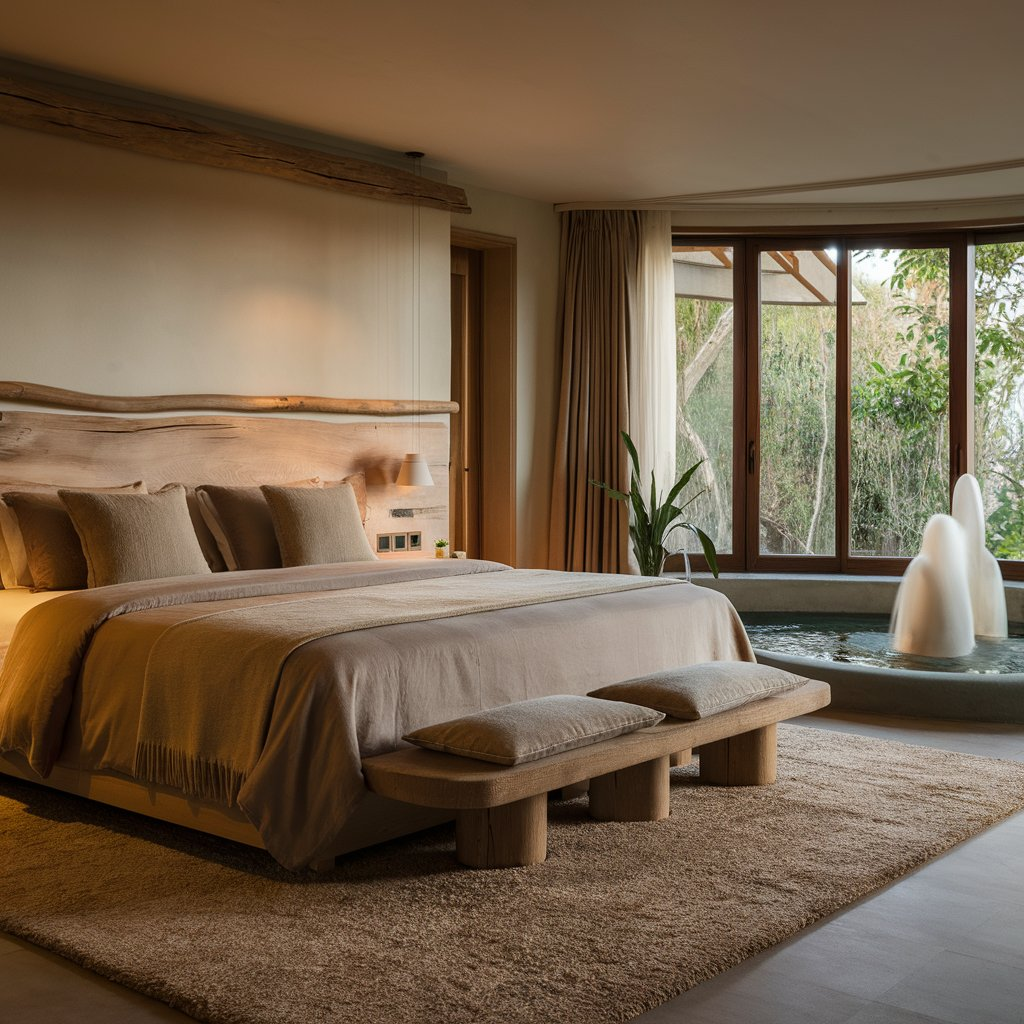
Transforming your bedroom with Feng Shui principles doesn’t require a complete overhaul—it’s about making mindful choices that enhance the energy of your space.
By incorporating these 28 Feng Shui bedroom ideas, you can create a room that fosters relaxation, balance, and optimal sleep.


